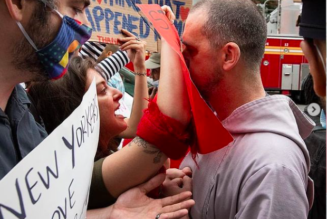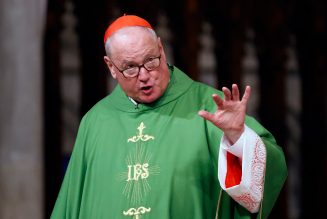Happy Friday friends,
I’m at my own house this weekend for, I think, the first time in about six months. So I am looking forward to that.
I was briefly in Chicago last weekend, which is always a joy. For those of you who don’t know, that’s where I’m actually from. Not “England” as JD insists, and certainly not New Jersey, as the Washington Post once libelously alleged of me. (They retracted and apologized, it’s fine.)
You never really forget where you’re from, I think, even if it all changes. In a cab near my Grandmother’s house, the driver asked me if I was from around here. I told him the last time I lived “around” here, “here” was a functioning naval air base surrounded by farmland. It’s all suburban sprawl now.
But even so, the accents of the people, the lay of the horizon, the patchwork repairs on the winter worn roads, and even the feel of the iron gray March sky, felt like home to me no matter after how many years away.
Next weekend is, if you didn’t know, traditionally known as “Mothering Sunday,” from which the Hallmark derivative Mothers’ Day comes. Mothering Sunday has actually nothing to do with your momma. It refers to the old English Catholic practice of visiting the church of one’s baptism — your “mother church” — on the fourth Sunday of Lent, to remember where you come from sacramentally and give thanks for the personal history of salvation God is working in your life through the Church.
It’s good to go home. So make your plans now.
The News
Amid ongoing persecution of the Church, the Nicaraguan government closed two Catholic universities and the local branch of Caritas this week.
The government, which has overseen the expulsion of religious communities, priests, and a papal delegate from the country, and imprisoned Bishop Rolando Álvarez, said the schools failed to comply with financial and governance reporting laws. The rector of the Universidad Juan Pablo II was among three priests recently sentenced to 10 years in prison, stripped of their nationalities, and then forcefully sent into exile to the U.S.
The government shuttered Caritas using a 2022 law restricting the work of aid organizations in the country and barring overseas donations. To continue operations, the charity would also have had to register as a “foreign agent,” putting its directors at risk.
The fate of Catholics and Catholic institutions in Nicaragua is unfolding in real time. It’s terrible, and it is only getting worse. We are going to keep covering it, and we all need to see what is happening.
—
The Society of Jesus has clarified the “restrictions” placed on Fr. Marko Rupnik, S.J., the internationally renowned religious artist and accused serial sexual abuser, after he was pictured concelebrating Mass with his local Jesuit superior.
Rupnik celebrated the Mass together with Fr. Milan Zust, who is the local Jesuit superior of Holy Trinity House, the Jesuit community at the Centro Aletti, a Rome-based center for arts and culture launched by Rupnik and where he is now resident while under further investigation for the sexual abuse of as many as 25 women, dating back decades and up to as recently as 2018.
When questioned about why the priest, who is supposedly barred from public ministry, was seen concelebrating the Mass, the Society of Jesus clarified that the restrictions didn’t apply “in the context of the Aletti Center, which is his inner circle, his community.”
This, of course, raises all kinds of questions about what other restrictions placed on him don’t actually apply “in the context of his community,” where quite a few of his alleged offenses are said to have been committed in the first place.
More broadly, the cycle of the Rupnik case — in which yet more horrific allegations are brought forward, the priest is supposedly placed under even more restricted ministry, only to be seen apparently carrying on as normal — appears to be on a constant loop, even while the Jesuits insist they are taking renewed action against him which could see him thrown out of the order.
In the meantime, Rupnik has become now perhaps even more globally known for his crimes, like abusing the sacrament of confession and dozens of women religious, than for his artwork, which is featured in prominent churches around the world.
His apparent imperviousness to discipline has led a lot of Catholics, and not just Vatican intrigue obsessives or Church news junkies, to wonder how, exactly, Rupnik seems able to always continue in ministry.
Well, here’s what we know for now.
—
This week, the German synodal way is meeting for its final assembly.
Many of the more important votes, which must be carried by a two-thirds majority of the bishops to be adopted, are happening today, and we will bring you all the news on what’s passed, what’s been rejected, and who is protesting about what on the synodal floor later today.
—
Meanwhile, in Belgium, a booklet arguing that “to abolish clericalism, we must abolish the clergy” has ignited controversy.
It also spawned a petition opposing its thesis, which gathered more than 600 signatures in 48 hours.
While the notion may seem radical, even for Belgium, credit where it’s due: the authors consider and dismiss the idea of ordaining women and married men, saying “This idea is based on the need to have a clergy at all costs, even if it means changing the rules of access to the sacred.”
“We even think that, in order to abolish clericalism, we must abolish the clergy,” the authors (who include two priests of the diocese) wrote, while criticizing what it called the “eucharistic-centric” focus of the contemporary Church.
Like similar radical proposals in Germany, the Belgian booklet claims that it’s offering a constructive response to the clerical abuse crisis. It has not been well received by the local bishop.
You can read all about it here.
—
Pope Francis confirmed new statutes for the Institute for Works of Religion this week. It’s commonly called IOR — pronounced ee-yore if you’re in the curia — or, if you really must, “the Vatican bank.”
What’s interesting about the IOR and its new statutes is that it has become pretty much the most credible financial institution in the Vatican, largely thanks to years of reform under its current president Jean-Baptiste De Franssu. And what the new norms don’t seem to mention is the relation of the bank to the Vatican’s internal financial watchdog, the ASIF, which is supposed to be looking over the IOR’s shoulder.
This might be because the ASIF’s former leadership is currently on trial in the Vatican for abuse of office, and it’s the IOR’s top brass who started the ball rolling to put them there.
Don’t know what I’m talking about? Read all about it here.
Chinese whispers
Hong Kong’s Bishop Stephen Chow will make a five-day visit to the Archdiocese of Beijing next month, his office announced this week, where he will be spending time with Bishop Joseph Li Shan, head of the archdiocese and the leader of the state-sponsored Chinese Patriotic Catholic Association (CPCA).
The visit has prompted a lot of speculation among China watchers and Vatican commentators. What does it mean? Is Chow paying court to the mainland Church? Is Hong Kong gearing up to come under the CPCA, and the norms of the (still unpopular and still unpublished) Vatican-China deal on the appointment of bishops?
Among Hong Kong and mainland clergy I’ve spoken with, the general consensus is that the visit, qua visit, is no big deal — Hong Kong is part of China, even if it is a special administrative region. And the Diocese of Hong Kong might be an island — give or take a small part of the mainland Guangdong province —but it’s not an ecclesiastical world unto itself. Some measure of communication and communion with the mainland is to be expected.
But, they pointed out to me, what is really interesting is the amount of play the visit’s announcement is getting in mainland news sources. It’s very unusual for Catholic bishops to get this kind of media attention in China. Which is why clerics in China suggested to me that the optics of the visit might be the point — rather than a sign of something to come.
Hong Kong’s coming closer to Beijing is a popular message with the Chinese government right now and, if it can be given a Catholic patina, even more so. Most of the people I spoke to suggested that seeing Chow come to see the leader of the CPCA is a PR victory in itself, and the trip will be spun as a “win” for perceptions of the Vatican-China deal.
For myself, I think there is a still more interesting story. Effectively the two most senior bishops in China are going to meet, and neither is a cardinal, nor likely to become one in the foreseeable future.
Chow’s immediate (and living) predecessors are cardinals over 80. In the recent past, his red hat would almost have been taken for granted. Instead, it now looks like a political impossibility. In part, this is thanks to the eroding civil rights situation in Hong Kong and the role of prominent Catholics like Cardinal Zen in the pro-democracy movement.
It’s also partly to do with the Vatican-China deal, and the diplomatic rapprochement between the Vatican and the mainland; confirming Hong Kong as the only cardinalatial see in China would likely be taken as an affront to the mainland.
Similarly, a red hat for Li would be taken as a vote of unqualified confidence by the pope in the state-affiliated Church on the mainland — in the face of ongoing defiance by communist authorities of the terms of its deal with Rome and the persecution of Catholics in different regions.
When the two bishops meet in Beijing next month, they’ll represent two faces of the Church in China. But however close they get, neither seems near to making it to Rome for the next conclave, and that may speak volumes about how Pope Francis really sees the state of the Church in China and his deal with Beijing.
He’s just not that into you
We’ve been covering the Vatican financial trial since it started, more than a year-and-a-half ago. While I’ve been transfixed, I’m willing to concede upfront that some of the slower trial days have not held everyone’s attention.
But if you haven’t before, pay attention now.
This week was some must-see TV in the Vatican City’s courtroom.
First, several witnesses scheduled to give evidence on Wednesday decided to no-show the trial, including the brother of Pillar reader Cardinal Angelo Becciu.
Becciu (the brother) and a local priest from Sardinia both said they wouldn’t come to the trial, because the Vatican court hadn’t given them sufficient “guarantees” about their participation.
What does that mean?
Well, apparently, the brother and the priest were worried that they would be asked a lot of awkward questions about whether they forged receipts for fictitious deliveries of 20 tons of bread to parishes, supposedly for distribution to the poor, and about the hundreds of thousands of euros of Church funds funneled to them by Becciu (the Pillar reader).
It seems the brother and the priest were concerned their answers could be used against them by Italian police, who are investigating them for all that (alleged) receipt forgery.
But the Vatican’s judge rejected their argument. He noted that they always have the right not to incriminate themselves, but they have to come to court. He issued a new summons.
Now, buckle up because that was just the opening act.
On Thursday, Pope Francis handed over to the court a series of letters between him and Cardinal Becciu, which were written in the days before the trial kicked off in 2021.
In the letters, Francis told Becciu that, whatever courtroom strategy he was hoping to deploy, the pontiff would not let him hide from question behind claims of state secrecy.
See, Becciu had asked the pope to apply the mantle of state secrecy to all of his dealings with Cecilia Marogna, his “private spy,” because of the claim that she supposedly helped free a kidnapped religious sister in Mali.
But the pope’s response was withering:
“I must point out the substantial difference between the two cases,” Francis said. “The first [Mali] concerns institutional activities carried out by competent people of undoubted professionalism in the context of their respective roles; the second [Marogna], as you well know, is characterized by extemporaneous and incautious assignments of financial resources diverted from the typical purposes and intended, according to [prosecutors], to satisfy personal voluptuous inclinations.”
What “voluptuous inclinations?” Whose “voluptuous inclinations?”
The pope doesn’t say. But the point is clear.
And then Becciu wrote back, demanding that Francis rescind his letter, and sign some decrees Becciu’s drafted for him.
Francis responded to say, basically, “you must not have heard me the first time, so…”
It is very interesting that Francis decided to make these letters available to the court now.
Francis has remained willing to see Becciu, even after sacking him and allowing him to stand trial, and has appeared genuinely concerned that the disgraced cardinal not be left totally out in the cold before proven guilty in court.
But every time he receives the cardinal privately, including as recently as last month, Becciu makes a statement to the press about how Francis is in his corner and going to reinstate him someday soon.
It now seems like the pope is finally fed up with Becciu trying to spin his personal acts of kindness into official papal endorsements. And Becciu may live to rue exhausting the pope’s patience and goodwill — especially because these letters don’t really make Becciu appear in a great light.
Putting aside how the judges might weigh the new evidence in the trial itself, if Becciu is eventually convicted on some of the several charges he faces, his only hope of avoiding a lengthy prison sentence and laicization would be papal clemency.
Becciu’s habit of taking Francis’ name in vain may end up costing him dearly.
You can read all about the hearings, and read the letters in full, here.
Star wars
You may not know, but there has been something of a cinematic space race going on for the last few years.
Americans, led by Tom Cruise and the guy who made “The Bourne Identity”have been battling some Russians, to see who could make the first feature-length film made in space.
Both sides have been aiming to shoot a movie on the International Space Station (ISS), in fact.
I regret to inform you that the Russkis seem to have won.
The trailer for “The Challenge” dropped this week, starring Yulia Peresild as a plucky cardiac surgeon dispatched to space as part of a team of seven doctors aiming to save a cosmonaut who’s fallen ill.
Up in space, according to one blurb I read, Peresild “battles to be recognized by the heroic men around her, one of whom tells her that ‘space isn’t for women’.”
From what I can tell, there is definitely a lot of Russian logic to the whole project.
I mean, my definition of an “heroic” man doesn’t encompass the sort of guy who tells a heart surgeon to get back to her knitting.
While we are on the subject, how exactly do you perform heart surgery in zero gravity? Open chest cavities and free-floating fluids seem like they’d be murder on the space station interior, if not the patient.
And I don’t want to nitpick, but how do you decide that sending seven doctors into space to treat one sick cosmonaut is a sound plan?
And how are they even getting there? A Roscosmos Soyuz rocket crew capsule (which is how cosmonauts get to the ISS) can only take a crew of three. So, what? They are sending the space ambulance crew up in three shifts? Allowing for even minimal weather delays, you’d need a week’s worth of launch windows to get them all up there, at least. And that’s assuming they have three separate Soyuz capsules ready to fly and space to dock them at the ISS.
I’ll probably see the movie if I can, just because I’m curious about what a movie shot in space looks like and, weirdly enough, it seems to be in English.
But I’m going to be waiting for whatever Tom Cruise comes up with, because I know I’ll have no such questions for him.
I really like that guy’s work. Indeed, in Chicago last week, sitting in a bar, I advanced the surprisingly unpopular opinion that Tom Cruise is an American hero to be celebrated.
Has he made some terrible films? For sure. Is he a scientologist? Yes. Do some of his interviews leave the impression that he might be in need of constant adult supervision? You bet.
But here’s the thing: he might be as wacky as a rubber chicken, but Tom Cruise takes his job damn seriously.
Whether it’s actually riding a motorcycle off a cliff and parachuting to the ground, really flying a fighter jet at 500 mph 30 feet off the ground, or just hanging off the wings of a biplane to cut a promo, this guy commits to the bit — when he says he wants to entertain you, you’re going to be entertained if it kills him. And I fully expect it will one day.
I don’t know what the plot of his space movie is, but I know I’m not going to have to worry about him trying to shove seven astronauts into a three-man capsule or taking liberties with medical science.
Tom will probably fly his Crew Dragon Falcon-9 rocket himself, and when he’s finished saving the world from an asteroid he’ll actually blow up, or whatever, he’ll free fall back to earth from near orbit with the Mission Impossible theme playing.
That’s a real American. Show some respect.
See you next week,
Ed. Condon
Editor
The Pillar










